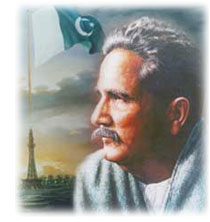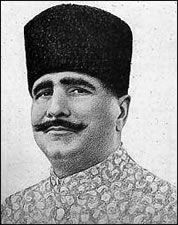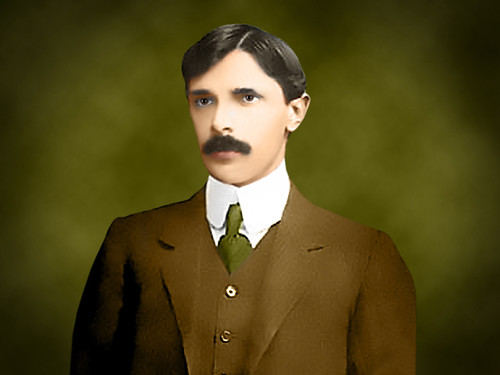Quaid-e-Azam`s Mausoleum is a prominent and impressive landmark of Karachi.
Designed by Architect Yahya Merchant, this white marble Mausoleum with its curved arches and copper grills was completed in 1970. Its cool interior reflects the green of a four-tiered crystal chandelier gifted by the peoples Republic of China.
There is a large park surrounding the mausoleum. It is a must place to be visiited. There are
Graves of 5 prominent leaders of that period are also located near the mausoleum, namely:
The “Quaid-e-Millat”. Liaqat Ali Khan, the first Prime Minister of Pakistan,
Her wife and great woman leader Begum Ra'ana Liaquat Ali Khan,
Quaid`s sister Miss Fatima Jinnah,
Sardar Abdur Rab Nishtar &
Mr. Noorul Ameen
some more buildings which are connected to this great leader:
a. Wazir Mansion Quaid's birth place at Kharadar, M.A. Jinnah Road.
b. Sind Madressatul Islam (1885), first Muslim School in Karachi, located just behind Habib Bank Plaza, Second largest building in Karachi.
The mausoleum of Mohammad Ali Jinnah (Dec 25 1876- Sep 11 1948) was build several years after his death, and is centrally located in the city of Karachi on top of a small hill. Before the advent of modernization (construction of high rises), the Mazar could have been seen from anywhere in Karachi.
The Mazar is surrounded by trees, and a garden laid in the format of Islamic art, with fountains all around it. You have to climb several steps to reach the top (shoes have to be removed before ascending), and the tomb is inside the Mazar. The actual grave is several meters below the marble tomb.
After every 20 minutes there is a ceremonial position shift of the honor guard, and every 4 hours changing of the guard. This is a must see if you are into military formalities.
There are also graves of Jinnah’s sister, Fatima Jinnah as well as first prime minister Liaqat Ali Khan (who was assassinated) and his wife, along with other dignitaries linked to the freedom movement.
In addition to the tombs, you can also see a small museum housing various artifacts used by Jinnah such as cars, dinning sets, bedroom furniture, swords and guns from is private collection etc.
Entrance fee:
Mazar: Rs 3/ for adults; Rs. 1/- for children (2-6 years old)
Museum: Rs 3/ for adults; Rs. 1/- for children (2-6 years old)
If you want to know more about Jinnah, a good biography you must read is "Jinnah of Pakistan" by Stanley Wolpert.
Address: Old Numaish M. A. Jinnah Road
Jinnah Mausoleum
Designed by Architect Yahya Merchant, this white marble Mausoleum with its curved arches and copper grills was completed in 1970. Its cool interior reflects the green of a four-tiered crystal chandelier gifted by the peoples Republic of China.
There is a large park surrounding the mausoleum. It is a must place to be visiited. There are
Graves of 5 prominent leaders of that period are also located near the mausoleum, namely:
The “Quaid-e-Millat”. Liaqat Ali Khan, the first Prime Minister of Pakistan,
Her wife and great woman leader Begum Ra'ana Liaquat Ali Khan,
Quaid`s sister Miss Fatima Jinnah,
Sardar Abdur Rab Nishtar &
Mr. Noorul Ameen
some more buildings which are connected to this great leader:
a. Wazir Mansion Quaid's birth place at Kharadar, M.A. Jinnah Road.
b. Sind Madressatul Islam (1885), first Muslim School in Karachi, located just behind Habib Bank Plaza, Second largest building in Karachi.
The mausoleum of Mohammad Ali Jinnah (Dec 25 1876- Sep 11 1948) was build several years after his death, and is centrally located in the city of Karachi on top of a small hill. Before the advent of modernization (construction of high rises), the Mazar could have been seen from anywhere in Karachi.
The Mazar is surrounded by trees, and a garden laid in the format of Islamic art, with fountains all around it. You have to climb several steps to reach the top (shoes have to be removed before ascending), and the tomb is inside the Mazar. The actual grave is several meters below the marble tomb.
After every 20 minutes there is a ceremonial position shift of the honor guard, and every 4 hours changing of the guard. This is a must see if you are into military formalities.
There are also graves of Jinnah’s sister, Fatima Jinnah as well as first prime minister Liaqat Ali Khan (who was assassinated) and his wife, along with other dignitaries linked to the freedom movement.
In addition to the tombs, you can also see a small museum housing various artifacts used by Jinnah such as cars, dinning sets, bedroom furniture, swords and guns from is private collection etc.
Entrance fee:
Mazar: Rs 3/ for adults; Rs. 1/- for children (2-6 years old)
Museum: Rs 3/ for adults; Rs. 1/- for children (2-6 years old)
If you want to know more about Jinnah, a good biography you must read is "Jinnah of Pakistan" by Stanley Wolpert.
Address: Old Numaish M. A. Jinnah Road
Mazar-e-Quaid
Mazar-e-Quaid
Mazar-e-Quaid
Mazar-e-Quaid
Mazar-e-Quaid
Mazar-e-Quaid
Mazar-e-Quaid
Mazar-e-Quaid
Items in Quaid-e-Azam's use



















